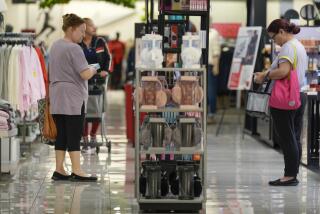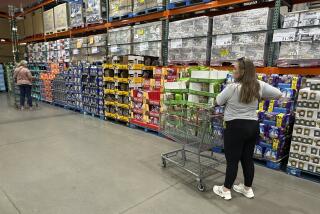Retail sales in July rise by the highest rate in five months
Shoppers lent a helping hand to the economy in July as retail sales grew by the largest amount in five months, bolstering hope that consumers will continue to buy despite worries over a stubbornly high unemployment rate.
The Commerce Department said sales rose 0.8% last month, beating economist expectations of a more modest 0.3% jump. The positive sign follows three previous months of declines that included a 0.7% drop in June.
“The consumers are coming back,” said Sung Won Sohn, economics professor at Cal State Channel Islands. “They were temporarily scared because of what was happening in Europe and China, and in parts of the country we also had weather problems. But now, consumer sentiment is thawing a little and people are out in the shopping centers looking for bargains and value.”
After a six-month job hunt, Martin Salyer, 22, landed a part-time position as a Starbucks barista and is spending more freely. He estimates dropping at least $600 in the last month on books, computer games and eating out.
“I was living for a long time on just what I had. There was nothing coming in,” said the Rancho Cucamonga college student. “Now that I’m working, I’ve been spending most of my paychecks.”
That’s good news for the economy because consumer spending accounts for about 70% of economic activity. Monthly retail sales figures are a closely watched economic indicator offering a glimpse into the mind-set of everyday shoppers. Some economists point to July’s uptick as a sign that people were regaining confidence and ready to drop money on an outfit, a car or furniture.
The Commerce Department reported all major categories picking up. Sales of automobiles increased 0.8%, while retail sales other than autos rose 0.8% as well.
“When consumers go on a spending spree, then the economy does well,” Sohn said. “If consumers close their wallets, as they did for a little while, then the economy suffers.”
But economists caution that despite gains in the job market, people still must contend with an unemployment rate that inched up to 8.3% in July.
Stocks responded to the positive retail sales report with a bump early Tuesday before closing mostly down.
The slow recovery is affecting consumers such as Ilianna Montoya, 22, a grocery store clerk whose hours were just slashed to 25 a week from 40.
“Everything is so expensive. Food is expensive and gas is expensive,” the Pasadena resident said. “I’m barely making it right now.”
With a drought in the Midwest affecting crops, consumers may face higher food prices in the coming months, economists say.
Last week, the U.S. Agriculture Department said the corn harvest was expected to plummet to the lowest level since 1995.
A separate Labor Department report Tuesday said that wholesale prices in the U.S., influenced by a big leap in corn costs and higher prices for automobiles, rose modestly in July.
The producer price index, which measures fluctuations in prices before they reach consumers, increased a seasonally adjusted 0.3%. Wholesale food prices had already nudged up 0.5%, while corn prices leaped 34.5%. The rising cost of corn, an ingredient in products as varied as soda and cattle feed, may bump up retail food prices even higher in the future.
More to Read
Inside the business of entertainment
The Wide Shot brings you news, analysis and insights on everything from streaming wars to production — and what it all means for the future.
You may occasionally receive promotional content from the Los Angeles Times.











